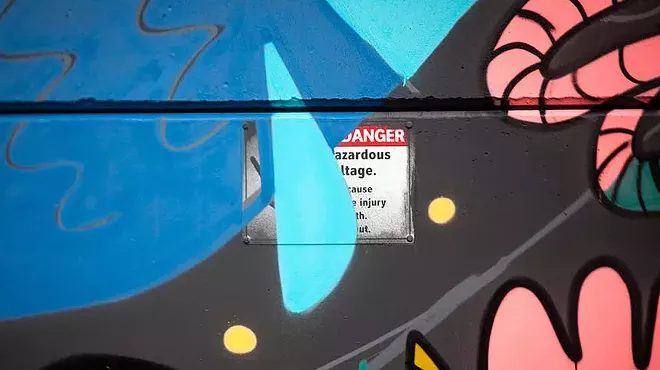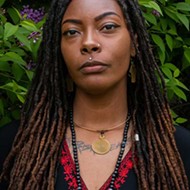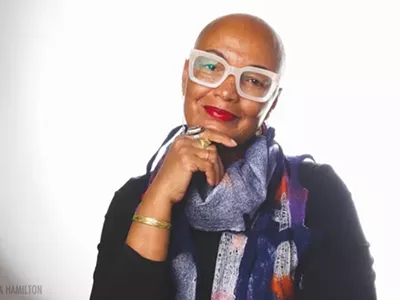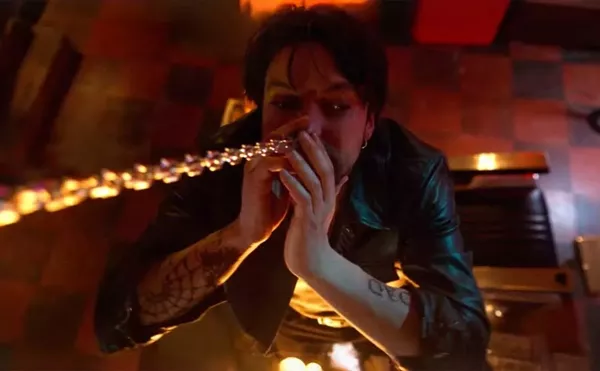‘You will be held accountable,’ artists decry in show criticizing DTE
Who will win in the clash over art, profit, and power?
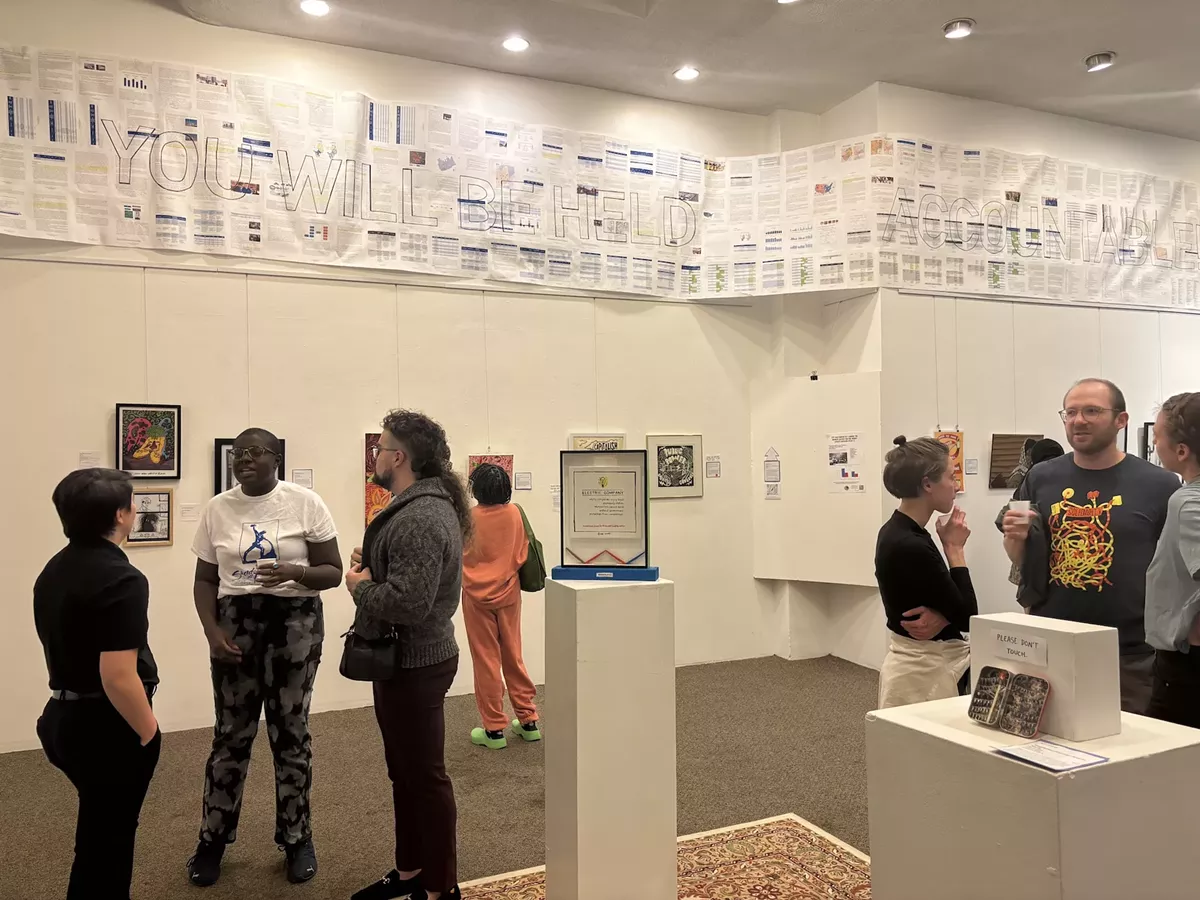

Audio By Carbonatix
[
{
"name": "GPT - Leaderboard - Inline - Content",
"component": "35519556",
"insertPoint": "5th",
"startingPoint": "3",
"requiredCountToDisplay": "3",
"maxInsertions": 100,
"adList": [
{
"adPreset": "LeaderboardInline"
}
]
}
]
It feels like the universe is rebelling against humanity. War, conflict, and fear swirl around us in a macrocosm as the fabric of our perceived reality begins to peel, revealing the farce of our absurd society.
It’s trying to teach us a lesson — that the power is in our hands because we, human beings, created these systems and lies we’ve been sold about how we have to live.
In Community Power: Artists Demand More From DTE at Detroit’s Swords Into Plowshares gallery, local artists have answered the call to reframe power and who wields it. The show was conceived by the peace center and gallery’s Political Artist Meetup in collaboration with the Work 4 Me DTE campaign as a response to the electric company’s repeated disinvestment in the Detroit communities it is supposed to serve. The show opened on Thursday, Nov. 16.
“YOU WILL BE HELD ACCOUNTABLE” a banner draped underneath the ceiling in the gallery reads. The words are written on the 279 pages of DTE’s 2023 Electric Distribution Grid Plan, which outlines the company’s plans to address its aging infrastructure over the next five years. The piece was put together by Heather Mawson.
In the gallery’s second room, a short film called “Dark Times” by Morgan Locke tells a story of a Detroit woman whose children were taken from her several times because she didn’t have any electricity. DTE shut her power off over missed payments when she was struggling to find a job and make ends meet. When she could afford to pay, DTE took forever to send a technician out to restore power, prolonging her time in the dark.
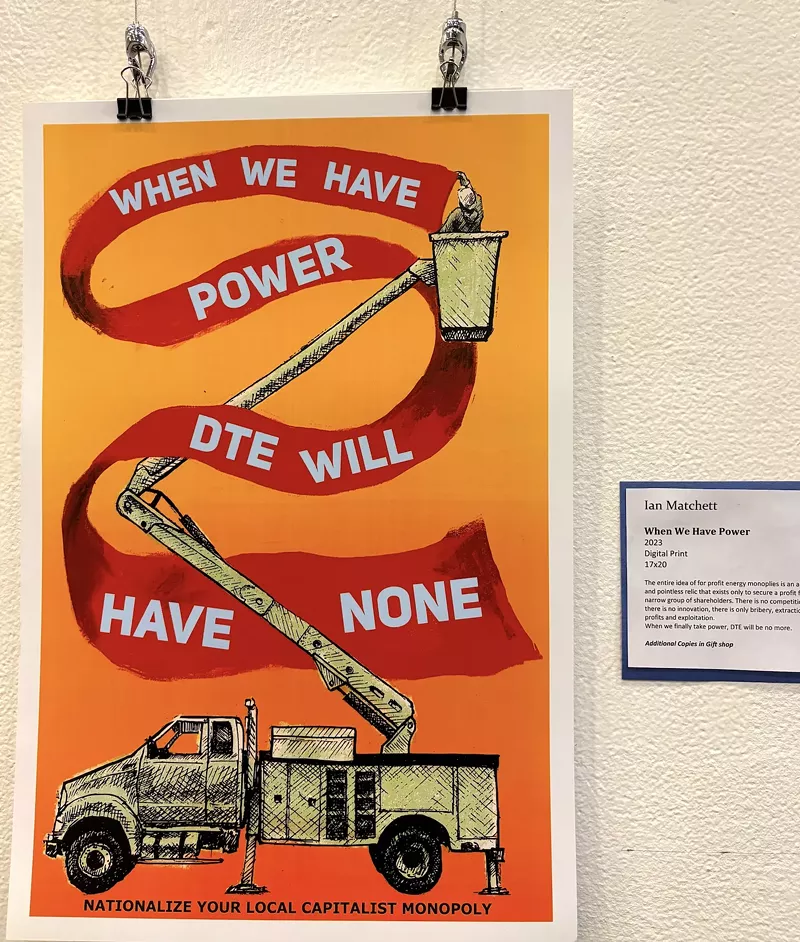
About halfway through the film, the screen goes black and we hear only the woman’s voice with subtitles to tell her story. The disembodied voice in darkness is unsettling.
This disquieting gloom transported me to the early 2000s, when I sat in my mother’s former home surrounded by candlelight. She was a single mother, and could hardly afford to pay her mortgage and bills, while saving to send her daughter to college. The electricity bill was late again and when my mother called a relative and asked her to come over and loan us some money so we could live in light, my aunt came and remarked about our “ambient mood lighting.” I had all but forgotten the shame and how much those words stung until I sat staring at the dark screen in the gallery.
Throughout the gallery are graphs showing that DTE customers pay among the highest rate for the worst utility services and households that spend more of their income on energy bills report experiencing longer outages.
The show is a criticism of capitalism and a rallying cry against the commodification of art amid DTE’s sponsorship of public art programming like the Murals in Islandview and BLKOUT Walls mural festivals. In both festivals, artists painted on DTE substations. We’re not mad at the artists for making their money, but it’s a shameful display of virtue signaling by DTE parading to “invest” in the city while they shut Detroiters’ lights off.
In my time writing about the Detroit arts scene, several artists have expressed to me (mostly off the record) frustration over the dance of making a living with their art versus upholding their artistic integrity. Sometimes you have to accept a job with sponsors who you morally disagree with because you need to pay your bills and don’t have the luxury of turning down lucrative jobs.
We’ve seen this clash between art and profit play out recently in the silencing of Cranbrook graduate students and alumni for voicing their support for Palestine as well. An alum who signed an open letter criticizing Cranbrook Academy after it removed Palestinian flags from its campus was abruptly dropped from David Klein Gallery for having the wrong opinion.
Likely, the rich people funding the school who believe their wallets give them unbridled control over artist’s voices sought to punish these students and alumni for not falling in line.
Art is for the artist and the magic their soul is called to birth into this reality. But what good is it if the artist can’t afford to live or their livelihood is being stripped away from them for using their voice?
Nothing about our society, fueled by late-stage capitalism and profit over human beings is natural. But we built this reality, and as such, we have the ability to destroy the systems of oppression that keep us working tirelessly to afford to live.
Sometimes being alive feels like a punishment. Ultimately, life is a death sentence in the end, but it can be beautiful when we use our time to create instead of destroy. How can we enjoy living when we are forced to pay for the things we need to survive — water, shelter, healthcare, food, and electricity?
Community Power not only demands more from DTE, it demands more from Detroiters. We are all tired of feeling like we're drowning. We’ve been tired. When are we going to come together and create alternate systems since the ones that govern us have so clearly failed? Is anyone home? Because we have the power. It’s time to turn on the lights.
Subscribe to Metro Times newsletters.
Follow us: Google News | NewsBreak | Reddit | Instagram | Facebook | Twitter

